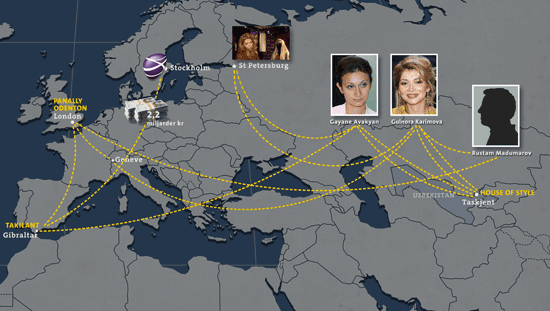Swedish television has broken a story about how a taxpayer-owned telecommunications company paid out hundreds of millions of dollars to an obscure overseas entity in exchange for telecom licenses in Uzbekistan.
Mission: Investigate, the leading Swedish public television current affairs program, reveals a Gibraltar-based entity called Takilant Ltd is the focus of a major money laundering investigation recently launched by Swiss authorities. More significantly, the sole director of the Gibraltar entity is a young Uzbek woman allegedly close to Gulnara Karimova, the oldest daughter of Uzbek President Islam Karimov. Karimov is generally criticized for running one of the world’s harshest dictatorships.
The latest revelations follow an earlier story by Mission: Investigate that disclosed how the partially publicly-owned Swedish telecommunications firm Teliasonera secretly cooperated with the Uzbek security services, allowing them to connect surveillance equipment to their network.
ICIJ member Frederik Laurin said many reporting hurdles had to be overcome. “The main obstacle with the research into Gulnara Karimova’s front woman, Gayane Avakyan, was the oppression in Uzbekistan. The medieval state of things there, people being jailed at random, getting their property stolen, phones tapped by Israeli experts and Swedish mobile operators. This made it extremely difficult to get anyone to say anything off or on the record,” he said. “But one good side of that is the Uzbek diaspora. Once we got in touch with leading Uzbek exiles we had a whole network of people able and willing to help.”
One important tool Laurin and his fellow investigators used was the human variety. They turned to a free research service provided by Miranda Patrucic of the Organized Crime and Corruption Reporting Project. “We were fortunate that the couple (Karimova and Avakyan) were not particularly sophisticated at hiding their tracks. With some help from Miranda we soon had the relevant documents from Gibraltar and London and we could start uncovering the puzzle,” said Laurin.
“And since Gulnara Karimova put her closest friends and associates as directors of her off-shore companies it didn’t take long to do what the Swedish state-owned Telco could and should have done – and most probably did: connect the dots.”
![]() Subscribe to The ICIJ Global Muckraker by email or get the RSS feed
Subscribe to The ICIJ Global Muckraker by email or get the RSS feed
